
IYP 不是过眼云烟的新闻网站,我们提供实战能力,这里是值得您反复回看的档案室:iyouport.org
Deglobalization and China's "Paper Tigers"
Thank you readers for your contributions!
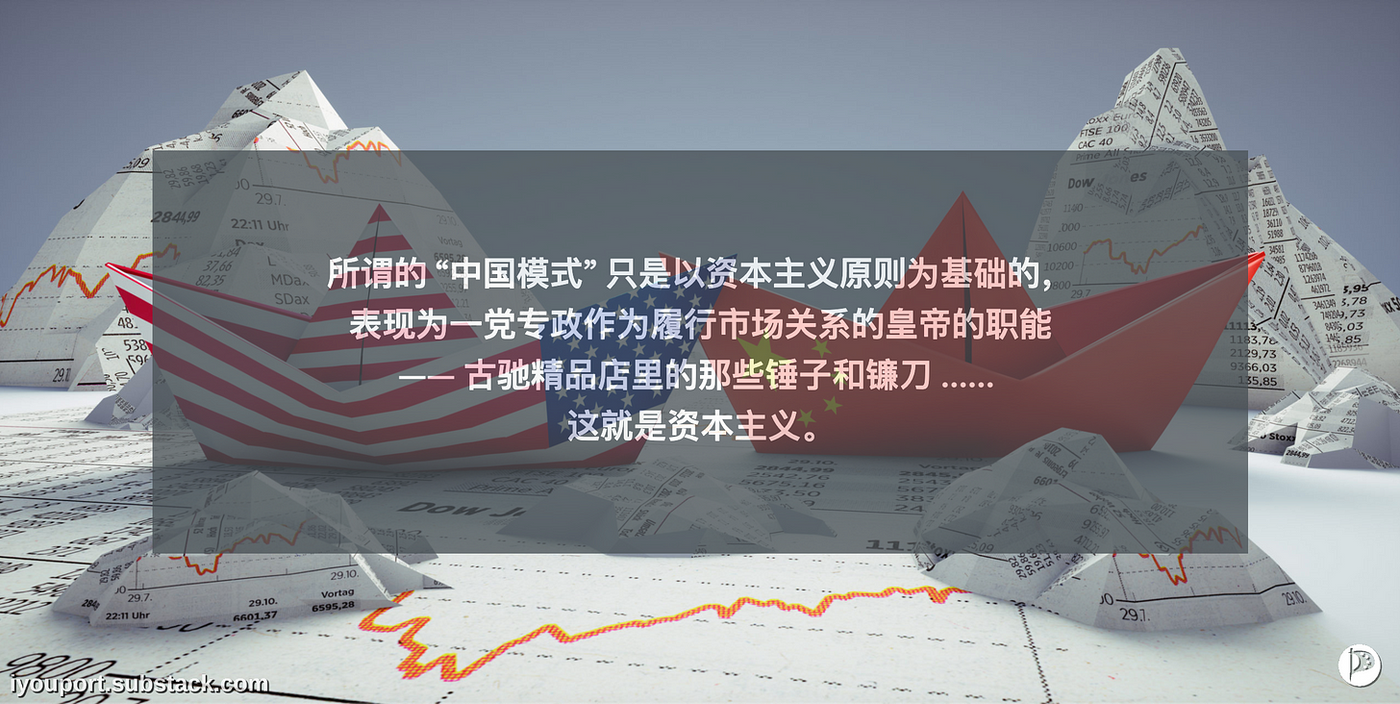
Globalization is coming to an end. In the near future, you will see the localization of industries, the restoration and strengthening of nationalism, which were once managed to solemnly in the post-Soviet fantasies of the so-called "end of history" and "a world with open borders" Buried things. There is no open world anymore. 50 shades of nationalism are emerging from the bloody bubble of empire.
Remember, globalization started out as a cunning but effective bribery : after World War II, the United States offered other countries what was not possible before - its fleet, or guaranteed access to any market, including its own Markets (the biggest on earth), manufacturers and sea lanes, which allow everyone to trade with everyone else and produce things at different, better prices...all in exchange for These countries joined the United States to fight the Soviet Union. In other words, the United States has successfully bought off its allies with its economic and military capabilities.
The plan was a success. The Soviet Union collapses, the United States becomes the hegemon, and everyone finds themselves in a world of interdependent markets, where Germany needs Russia to keep warm, Africa needs Ukraine's wheat to feed its stomach, and Apple needs China's cheap sweaty workers... embedded in each other. And today, at this fork in the road; there are still people who pretend not to understand why Ukraine did not receive a large number of long-range artillery pieces in time from its Western partners.
The globalization of capitalism and the contradictions of this economic model always lead to a series of increasingly severe recessions and imperial wars.
It's not about how to think about this pile of orders, or the labor cost of outsourcing production to cheap slave labor in Bangladesh, it's about a particular The form of order is becoming a thing of the past. It leaves a legacy - the next dystopian monster waiting for you on the other side of the imperial maelstrom .
Those pro-Putin bastards, full of quotes from Soviet Cold War books, are gleefully clamoring for the end of the resulting unipolar world, "Go to hell, America, you're not going to be the world's policeman. ". They don't know America. First, nationalism prevails, fleeing Afghanistan and other partners that are no longer needed and too costly; second, the United States, unlike Russia and the "rest of the world" to which it pushes its global economic system, has not fallen into in. Only 11% of U.S. GDP is exports. One third of it is oil. Two-thirds of the U.S. trade mix is in the Western Hemisphere. The world's main currency is still the US dollar. The U.S. economy is the largest, most isolated, and safest.
In short, America has beaten everyone by selling globalization to the world with a sweet liberal tune as a superstructure, while simultaneously being an empire of economic nationalism. For a number of geographic, demographic, and economic reasons, the United States is now in a better position than Russia, China, and Europe to weather the coming storm and benefit from it (and from all of us) .
I mean, there's no reason to be happy whether it's the guys who think their own rotten shoes still have a bright future, the Putinists who think America is about to decline, or those who forever count on the 20th century "world police" for dads . Things are worse than they seem, and many are just looking at this new battlefield with old glasses.
The question is not how a smarter empire will kill the stupid Kremlin bastards and enjoy the spectacle of China's "sunset", but when, and who of us will seize this once-in-a-lifetime opportunity to live up to it.
This at least involves countering all these pessimistic ethno-imperial views with a viable alternative that people are willing to follow .
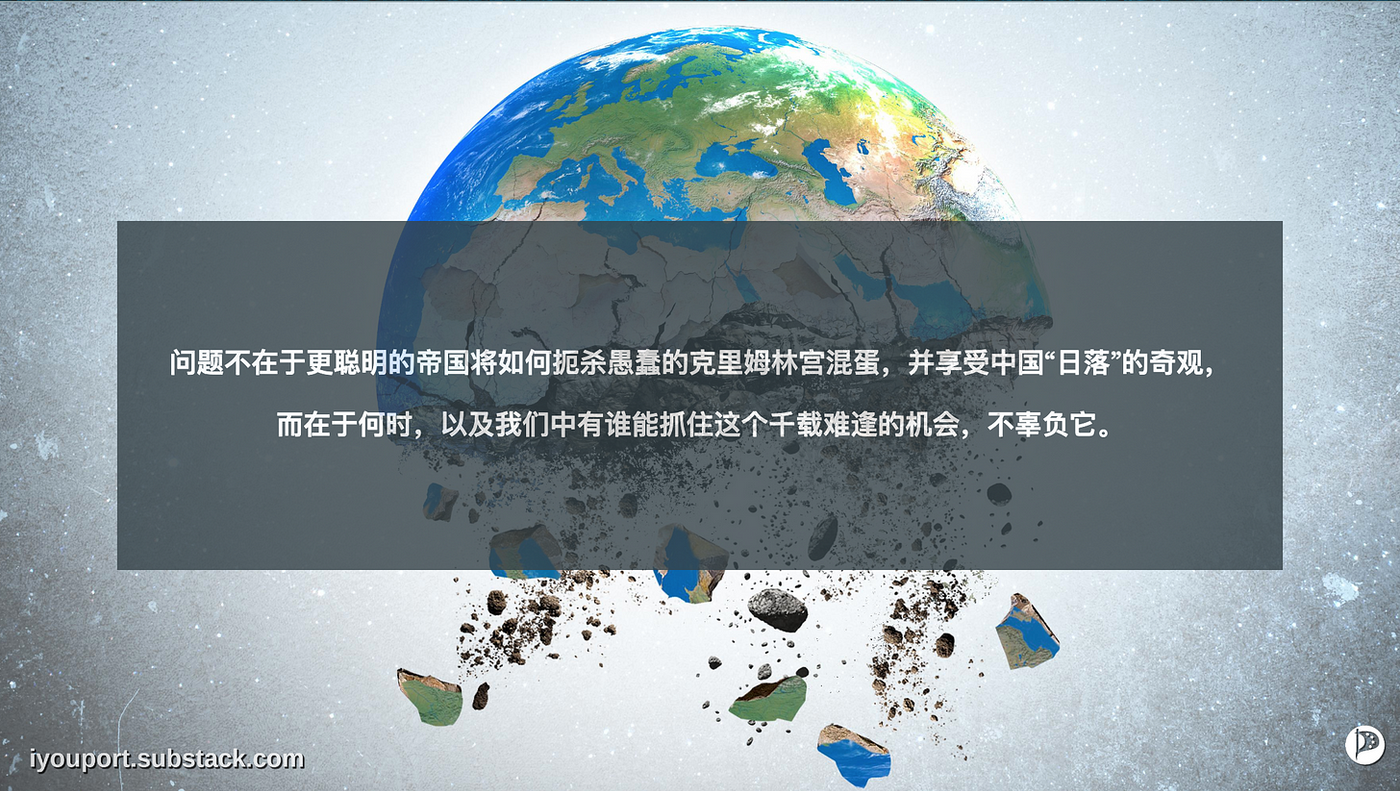
Speaking of China. China has the largest navy, but 90 percent of its warships cannot travel more than 1,000 miles offshore. At the same time, China is the largest exporter of goods (18.5% of China's GDP) and a major importer of oil (11.8 million barrels per day, while it needs a total of 15 million barrels). About half of these imports come from the Persian Gulf.
In other words, it's hard to imagine a postwar world order (globalization and "free markets") that relies more on the United States to secure maritime trade routes than China .
This was the product of the Mao-Nixon deal, which used the Sino-Soviet split of the late 1960s as an opportunity to cement America's position in the Cold War. The resulting economic system, of which China is one of the main beneficiaries, is a thing of the past.
In the face of deglobalization (which involves a redrawing of the market world order and a global storm of "open world" nationalist divisions), the US could be in a better position to stifle China through sanctions and blockades of sea lanes . These measures were enough to bring China out of power, industry stagnated, and famine began.
Can China get out of this fork in time? Can it avoid crashing under the weight of its own system? The story is developing to a critical turning point... the ending will become clear in the near future...
For rebels, "timing" can only be timing if you can use it effectively.
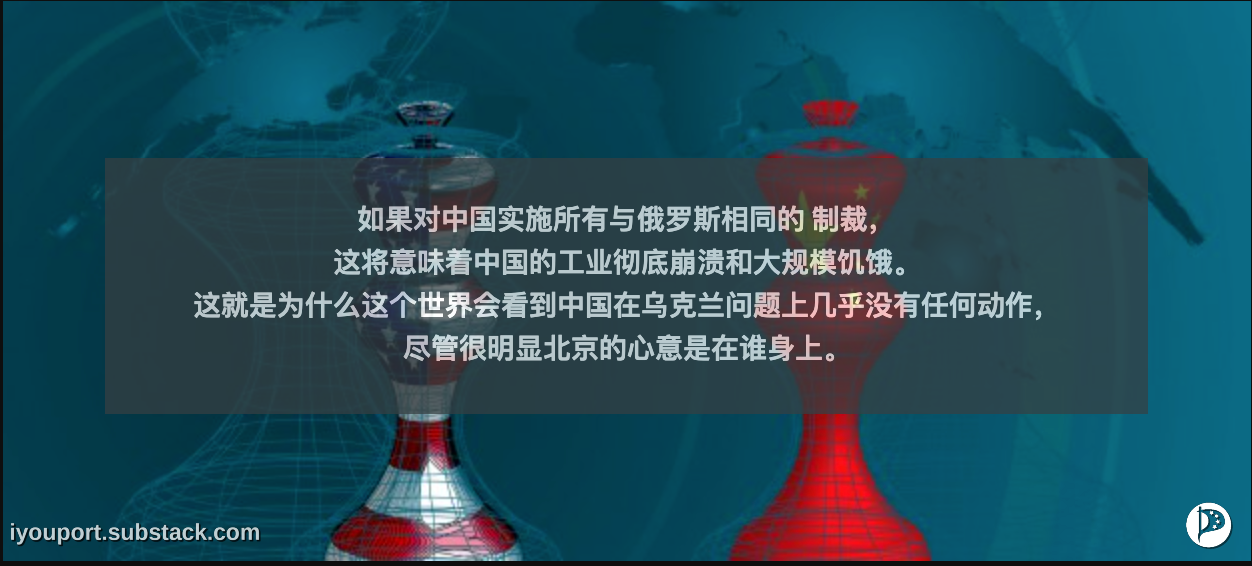
To understand why China's prospects are poor , one has to look at its demographic dynamics, the ticking time bomb planted in the so-called "China Miracle" by the 35-year "one-family-one-child" policy from 1980 to 2015. . As a result of this policy, China today is the fastest ageing society in human history, characterized by the greatest gender imbalance. This meant fewer and fewer people were able to produce and give birth, and the mouths to eat began to outnumber the hands to cook.
An important factor in the so-called "Chinese miracle" is the sea of cheap labor . That's why almost all Western companies rushed into the opening of the Celestial Empire and allowed others to flourish. On the bright side, wages for Chinese workers have risen like never before, which is why many traditional leftists are turning a blind eye to the market-oriented China model — a kind of New Economic Policy 2.0 that envisions “a real A functional alternative to socialism . And in fact, the so-called "China model" is only based on the principles of capitalism, showing the function of a one-party dictatorship as the emperor of market relations - those hammers and sickles in the Gucci boutiques... This is capitalism .
Today, with the aforementioned demographic crisis and economic dynamics, the ocean of cheap labor no longer exists , depriving China of a major advantage in the capitalist game . China is losing its status as " the most affordable place to implement industrial processes ".
Unlike Russia , China is not a significant food and energy producer, importing 85% of the energy it needs (about 40% of which comes from the Persian Gulf) and the resources used to grow food. So if all the same sanctions as Russia were imposed on China , it would mean a complete collapse of Chinese industry and mass starvation. That's why the world sees little if any action from China on Ukraine , even though it's clear who Beijing has in mind.
One can expect a lot from Xi Jinping, who is cut off from information within the framework of a cult of personality, worse than a Kremlin dictator. But that doesn't change the fact that the idea of import substitution doesn't fit the Chinese model at all, and all the prosperity of the Chinese model is tied to the fact that the whole world, led by the West, is moving towards them. If you take Gucci away from the Chinese sickle and hammer, the sickle and hammer will collapse. After all, they strapped the hammer and sickle to Gucci. And you know, far from Gucci.
Yes, China assembles the computers we all use with its own hands, but the Chinese did not invent these electronic devices, even though China spent billions of dollars to create its own chip production technology. However, so far, China's capabilities have not been sufficient to produce semiconductors according to advanced technological processes. That is, in this sense, isolation and sanctions do China no favors, even though it is now trying to adjust its production system so that it is not dependent on the outside world. But it takes time, and given what's going on, the Chinese system simply doesn't have that time.
Then there's Covid . Yes, China was considered "well done" in the first wave of the pandemic. But that's a thing of the past. And China's vaccine doesn't work against the new variant of the coronavirus. China has not been able to improve it yet. So they are left with a blockade like Shanghai. But none of this will work without a vaccine. Who will work? Who will spend the money? Shanghai is one of the largest producers and ports in the world, it can be closed, but... the regime and its durability depend on the economy. Sooner or later, all these people who are locked up - in which social discontent is growing - will have to be released, after which they will soon be re-infected, and in the absence of an effective vaccine, they will have to be released again Locked up, and so on, until the economy dies or a revolution breaks out .
In short, the classic Chinese metaphor of "paper tiger" is perfectly applicable to today's China. ⭕️
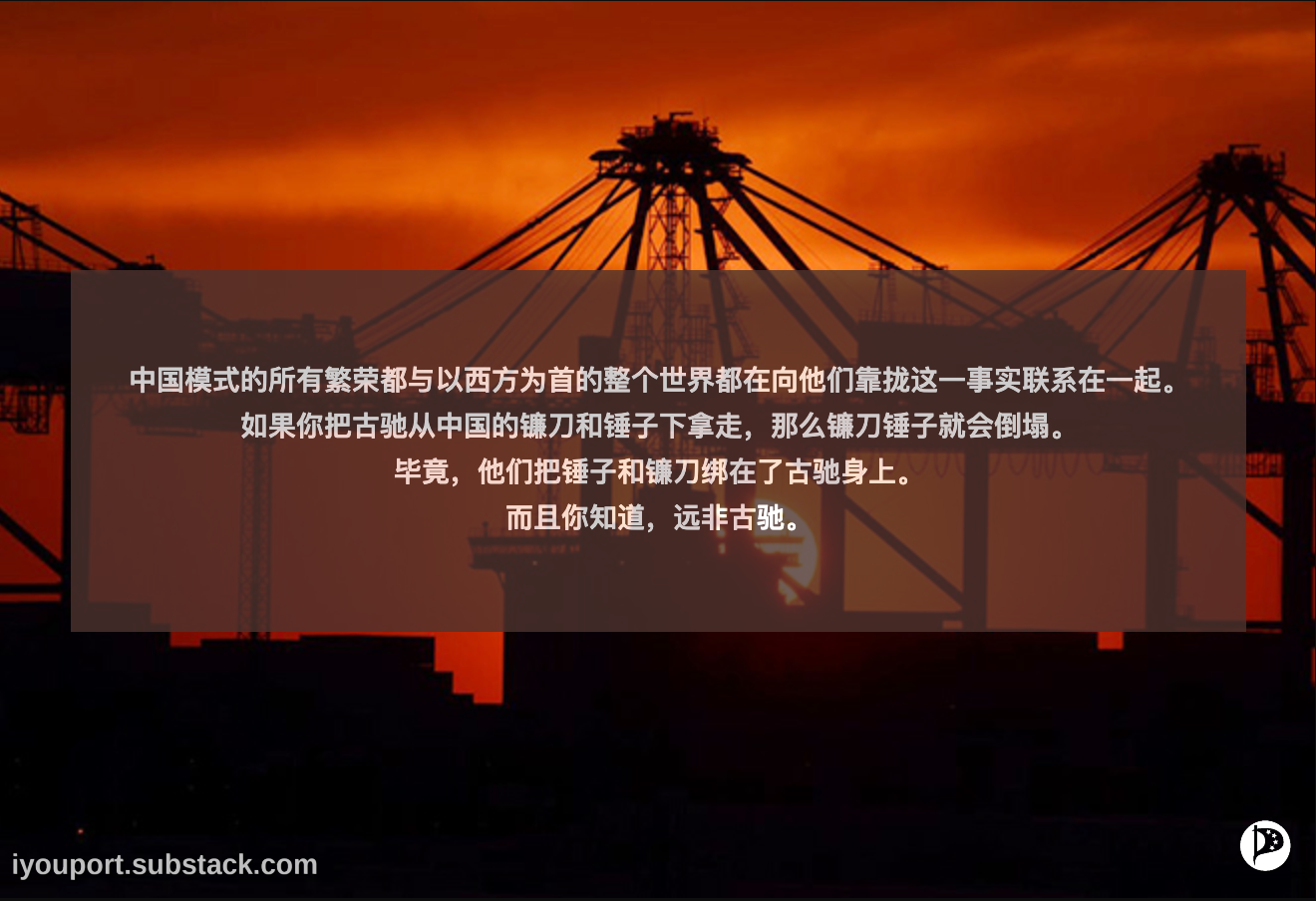
#Globalisation #Imperialism #Nationalism #China #ZeroCovidPolicy #PopulationCrisis #Economy #Revolution #globalisation #imperialism #nationalism #china #clearing #populationcrisis #economy #revolution
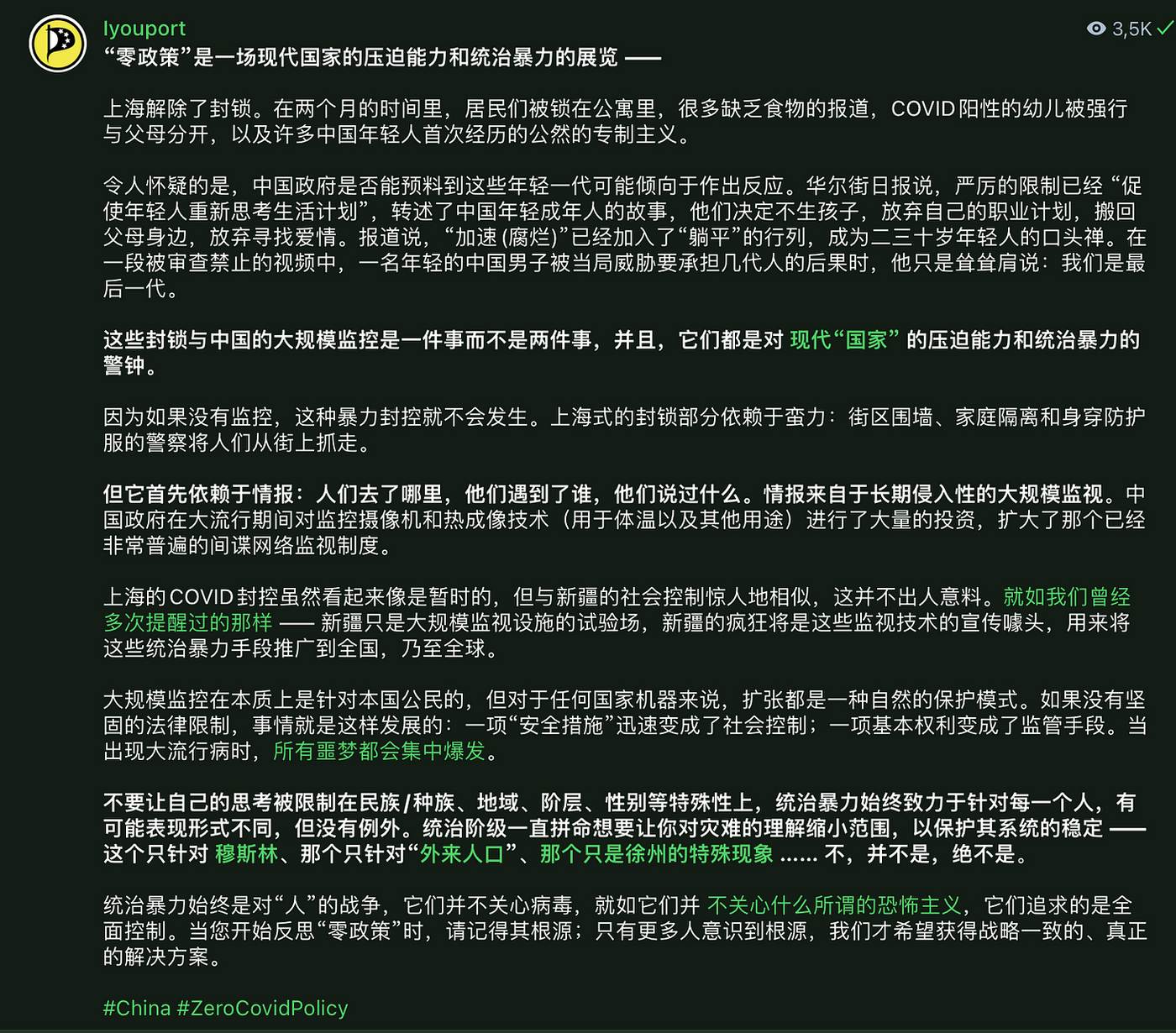
Like my work?
Don't forget to support or like, so I know you are with me..
Comment…